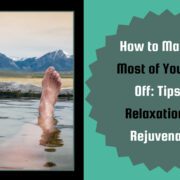Sleep Debt: How to Pay It Off and Improve Sleep Quality

As I’ve grown older, the importance of sleep has become increasingly clear to me. The consequences of not getting enough sleep, also known as sleep debt, quickly catch up with me, leaving me feeling off-balance and affecting my interactions with others. Recognizing the impact on my well-being, I’ve developed a fascination with maintaining a healthy sleep balance. In this article, we will talk about the concept of sleep debt—what it entails, why it’s crucial to address, and most importantly, how you can effectively manage and repay your sleep debt to promote better sleep and overall health
What is Sleep Debt?
Sleep debt, also known as sleep deficit, is the cumulative effect of not getting enough sleep. A large sleep debt may lead to mental or physical fatigue, impacting your daily performance and overall health. Just like financial debt, sleep debt accumulates over time, and it’s essential to pay it back to maintain a healthy lifestyle.
Symptoms of Sleep Debt
Some common symptoms of sleep debt include:
- Difficulty concentrating
- Irritability and mood swings
- Decreased productivity
- Memory problems
- Weakened immune system
- Increased risk of accidents
Can You Reverse Sleep Debt?
Yes, you can reverse sleep debt by catching up on lost sleep. However, it’s important to understand that repaying sleep debt doesn’t happen overnight. It takes time, consistency, and dedication to improve your sleep quality and quantity.
How to Repay Your Sleep Debt and Improve Sleep Quality
Step 1: Determine Your Sleep Debt
To repay your sleep debt, you need to know how much sleep you’re missing. Track your sleep for a week or two, noting the number of hours you sleep each night. Compare your actual sleep time to the recommended 7-9 hours for adults to calculate your sleep debt.
Step 2: Prioritize Sleep
Make sleep a priority in your daily schedule. Ensure you’re allocating enough time for sleep each night and avoid activities that may interfere with your sleep schedule, such as late-night socializing or screen time.
Step 3: Create a Sleep-Friendly Environment
Optimize your sleep environment by:
- Maintaining a comfortable room temperature
- Eliminating noise and light distractions
- Investing in a comfortable mattress and pillows
- Using blackout curtains or a sleep mask
- Creating a calming bedtime routine
Step 4: Gradually Increase Sleep Time
Instead of trying to catch up on lost sleep all at once, gradually increase your sleep time by 15-30 minutes each night. This will allow your body to adjust to the new sleep schedule and avoid disrupting your circadian rhythm.
Step 5: Take Power Naps
Short naps during the day can help reduce sleep debt. Aim for 20-30 minute power naps to boost alertness and energy without causing grogginess or interfering with nighttime sleep.
Step 6: Maintain a Consistent Sleep Schedule
Sticking to a consistent sleep schedule helps regulate your body’s internal clock, making it easier to fall asleep and wake up each day. Aim to go to bed and wake up at the same time every day, even on weekends.
The Least Amount of Sleep You Can Survive On
While the recommended amount of sleep for adults is 7-9 hours per night, the least amount of sleep an individual can survive on varies from person to person. Some people may function on as little as 4-5 hours of sleep per night, while others may require more. However, consistently getting less than the recommended amount of sleep can lead to long-term health consequences.
Why Can’t I Sleep Even Though I’m Tired?
Several factors can contribute to difficulty falling asleep, even when you’re tired:
- Stress and anxiety
- Poor sleep environment
- Overstimulation from electronic devices
- Consuming caffeine or alcohol close to bedtime
- Irregular sleep schedule
Addressing these factors and creating a consistent bedtime routine can help improve your ability to fall asleep when tired.
Why Do I Wake Up at 2 am and Can’t Go Back to Sleep?
Waking up in the middle of the night and having trouble falling back asleep is known as sleep maintenance insomnia. Some potential causes include:
- Stress and anxiety
- Medical conditions, such as sleep apnea or restless leg syndrome
- Hormonal imbalances
- Alcohol or nicotine use
- Poor sleep hygiene
- Nocturia (frequent nighttime urination)
To address sleep maintenance insomnia, consider the following strategies:
- Maintain a consistent sleep schedule: Going to bed and waking up at the same time each day can help regulate your body’s internal clock and improve sleep maintenance.
- Limit exposure to screens before bedtime: Blue light emitted from screens can interfere with melatonin production, making it harder to fall back asleep.
- Limit alcohol and nicotine intake: Both substances can disrupt sleep patterns and affect sleep quality. (I have trouble here. I’m not much of a drinker, but I can’t put down the darn vape!)
- Create a relaxing bedtime routine: Engaging in calming activities, such as reading or taking a warm bath, can signal to your body that it’s time to sleep. (I have three words for you – Melatonin Bath Bombs!)
- Consult a healthcare professional: If you continue to experience sleep maintenance insomnia despite making lifestyle changes, it may be helpful to consult a healthcare professional to explore potential underlying causes and treatment options.
Shopping Ideas for Better Sleep
Here are some tech-driven products I recommend to help you sleep better:
- Bluetooth Sleep Mask
- Lenovo Smart Alarm Clock
- Comfy pillows
- 2-in-1 Personal Fan + White Noise Machine
- ZzzQuil (For when all else fails.)
Wrapping Up
In conclusion, repaying your sleep debt and improving sleep quality are vital for your mental and physical well-being. By identifying the factors that contribute to sleep deprivation, prioritizing sleep, creating a sleep-friendly environment, and maintaining a consistent sleep schedule, you can reclaim the best nights of sleep in your life.
So, embrace the journey towards better sleep, and watch as it transforms not only your own well-being but also your interactions with those who matter most. Remember, investing in quality sleep is an investment in yourself and the relationships you hold dear. Sleep well and wake up ready to conquer each day!
And if you’re still having trouble getting some shut-eye, perhaps consider looking into hemp products. I can’t speak highly of the benefits these provide, but that’ll be for another post sometime down the road. Stay tuned!
Tony has a bachelor’s degree from the University of Phoenix and over 14 years of writing experience between multiple publications in the tech, photography, lifestyle, and deal industries.








Leave a Reply
Want to join the discussion?Feel free to contribute!